
NIL
Dakar and Catrion team up to elevate catering experience at the Dakar


CATRION joins forces with Dakar to Enhance the Experience of the Rally’s Sixth Edition in Saudi Arabia.
Strategic Partnership Highlights CATRION’s Commitment to Global Sports and Saudi Arabia’s Vision 2030 Goals.
Delivering Excellence: Over 9,000 Meals Daily and Cutting-Edge Catering Solutions in Remote Conditions.
Showcasing Saudi Arabia’s Landscape and Culture: Dakar Rally as a Platform for Innovation and Global Engagement.
Dakar and CATRION announced their partnership for the Dakar Rally Saudi Arabia 2025, taking place from January 3–17, 2025, across Saudi Arabia. As both the main sponsor and exclusive catering partner, CATRION brings its expertise to redefine collaboration in global motorsport events. This partnership reflects CATRION’s commitment to advancing global sports and entertainment with world-class services. It aligns with Saudi Arabia’s Vision 2030, reinforcing the Kingdom’s position as a premier hub for international events, innovation, and economic diversification. CATRION’s role as the exclusive catering partner will see the company providing over 9,000 meals daily, supporting more than 3,000 participants, staff, and support teams across the rally. Leveraging its expertise in remote catering, CATRION will deploy 6 mobile kitchens, 34 support trucks, and 5 food trucks, supported by a dedicated team of over 165 professionals, including 35 chefs. This robust infrastructure ensures exceptional service delivery even in the most remote and challenging environments. The Dakar Rally’s approximately 8,000-kilometre route, spanning from Bisha to Shubaytah, highlights Saudi Arabia’s breathtaking landscapes and cultural richness. With over 5,000 kilometres of special stages, including a 48-hour chrono stage and a marathon stage, the rally exemplifies the spirit of adventure and endurance. This partnership between Dakar and CATRION not only supports Saudi Arabia’s vision of becoming a global destination for international sports but also enhances the Kingdom’s position as a dynamic hub for sports, entertainment, and innovation. For CATRION, this collaboration represents a significant milestone as it expands its expertise from in-flight catering to large-scale event services and global sports sponsorships. Together, Dakar and CATRION are setting a new benchmark for partnerships in motorsport, ensuring an unparalleled experience for participants and spectators alike, while contributing to the growth and visibility of Saudi Arabia as a global leader in sports and entertainment. This partnership with Dakar and Saudi Motorsport Company (SMC) highlights CATRION’s innovative approach to supporting high-profile events while reinforcing its commitment to operational excellence, sustainability, and the highest standards of quality.
January 5
th
2025
– 08:36
[GMT + 3]
NIL
2026 football schedule change announced
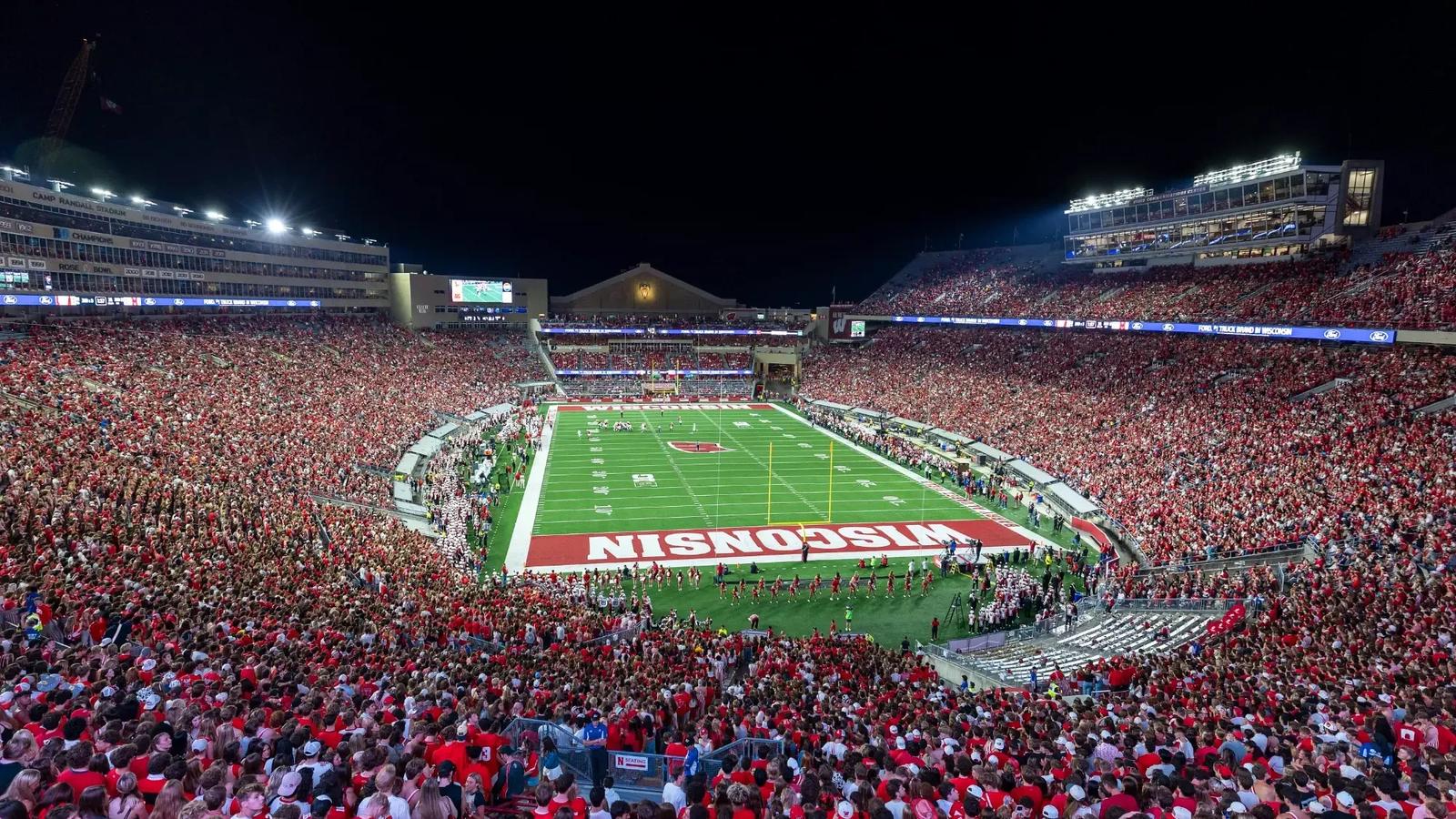
NIL
Major college football program jumps 96 spots in updated recruiting rankings
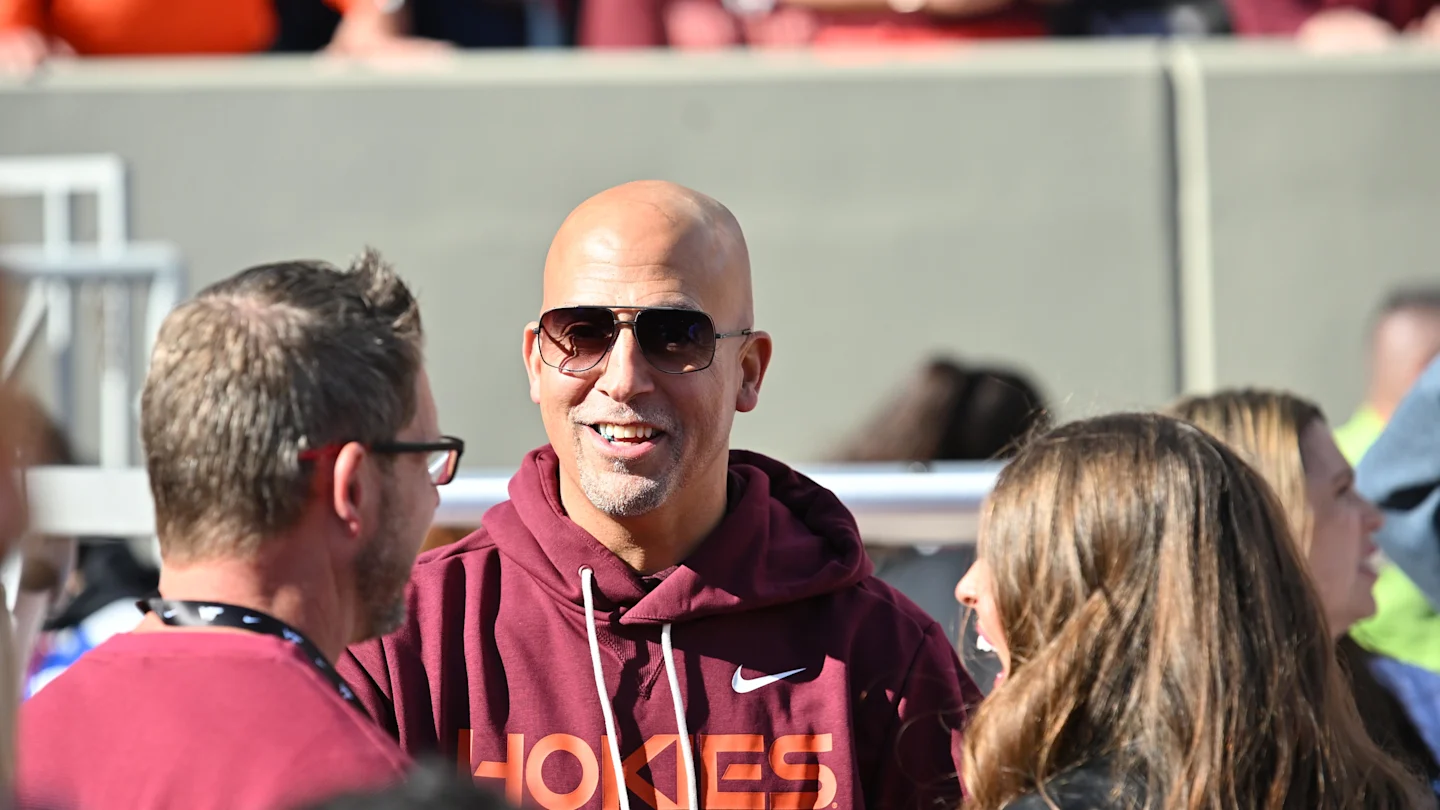
Blacksburg’s recruiting thermometer spiked within days of James Franklin’s arrival.
The former Penn State coach was introduced by Virginia Tech on November 17 after a 12-season run with the Nittany Lions that saw him win a Big Ten title, appear in the 2024 College Football Playoff semifinal, and leave with a 128-60 overall record.
In just over two weeks since taking the Hokies job, Franklin has already translated relationships and urgency into rapid sign-and-flip activity that dramatically improved the program’s industry rankings.
Industry trackers pegged Virginia Tech outside the top 100 (No. 121) on November 25; by Tuesday, the program had climbed up 96 spots to No. 25 after a string of commitments and flips, several of them former Penn State pledges.
Over a short window, Franklin and his staff flipped multiple four-star prospects, adding playmakers on both lines and at skill positions.
Some of the biggest moves include flipping six four-star recruits — LB Terry Wiggins, QB Troy Huhn, TE Pierce Petersohn, WR Davion Brown, OT Marlen Bright, and RB Messiah Mickens — all of whom decommitted from Penn State after Franklin’s firing.
That volume, not just a single headline recruit, is what pushed the Hokies up industry leaderboards.

Franklin’s early, unceremonious exit at 3-3 hasn’t disrupted his recruiting relationships.
For Virginia Tech, after a 3-9 season and a mid-season coaching change, the immediate priority was reestablishing connections and winning back recruits.
Franklin’s staff accomplished that quickly, which gives athletic directors, donors, and fans visible proof the program can compete for top regional talent again.
Virginia Tech’s 2026 schedule features home games against VMI, Old Dominion, and James Madison, along with a road test at Maryland before an ACC slate that features Clemson, Miami, NC State, Georgia Tech, Pittsburgh, Boston College, California, and Virginia.
If victories don’t come early, the recruiting spike risks fading before Franklin’s rebuild fully takes shape.
Read More at College Football HQ
- Nick Saban sends strong message on major SEC college football coach after taking new job
- $11.2 million college football coach signs extension amid departure rumors
- $29.6 million college football coach reportedly retires after seven seasons
- Major college football program set to make 29th straight bowl game appearance
NIL
College Football TV Ratings: Top 10 most-watched games of Week 14
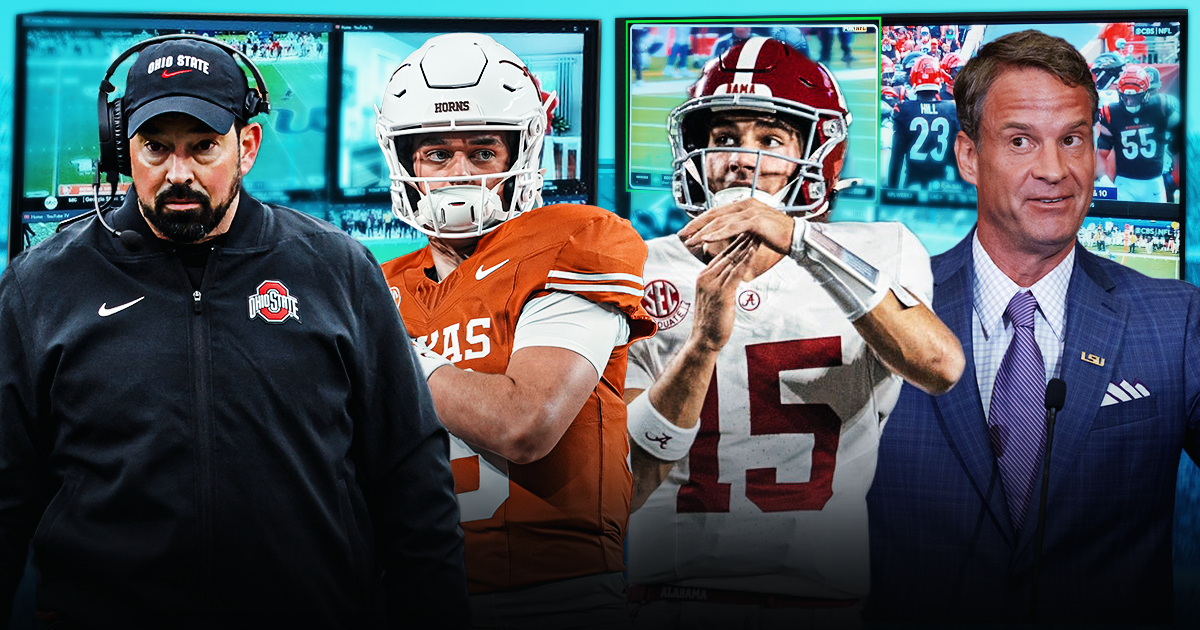
The final week of the regular season delivered plenty of rivalry flare. It was also an opportunity for networks to score more TV ratings wins to close out the college football campaign, and On3 is breaking down the most-watched games of Week 14.
The Week 14 slate began on Thanksgiving with Navy vs. Memphis before a jam-packed Black Friday slate of SEC rivalry games. From there, Saturday had more marquee matchups, headlined by Michigan vs. Ohio State in the early window, which became the most-watched college football game of the 2025 season.
SUBSCRIBE to the On3 NIL and Sports Business Newsletter
On3 obtained Nielsen Big Data + Panel ratings data for the most-watched rivalry games of Week 14. Here is the full breakdown of the week’s college football TV ratings.
Note: SEC Network, ACC Network and CBS Sports Network do not pay for Nielsen to measure viewership.
Michigan vs. Ohio State
Date/Time: Nov. 29, Noon ET
Channel: FOX
Viewers: 18.4 million
The Game was once again a big draw in Week 14 and became the most-watched game of the season. Ohio State’s victory over Michigan averaged 18.4 million viewers on FOX to lead the charge as the Buckeyes ended their losing streak against the Wolverines.
Texas vs. Texas A&M
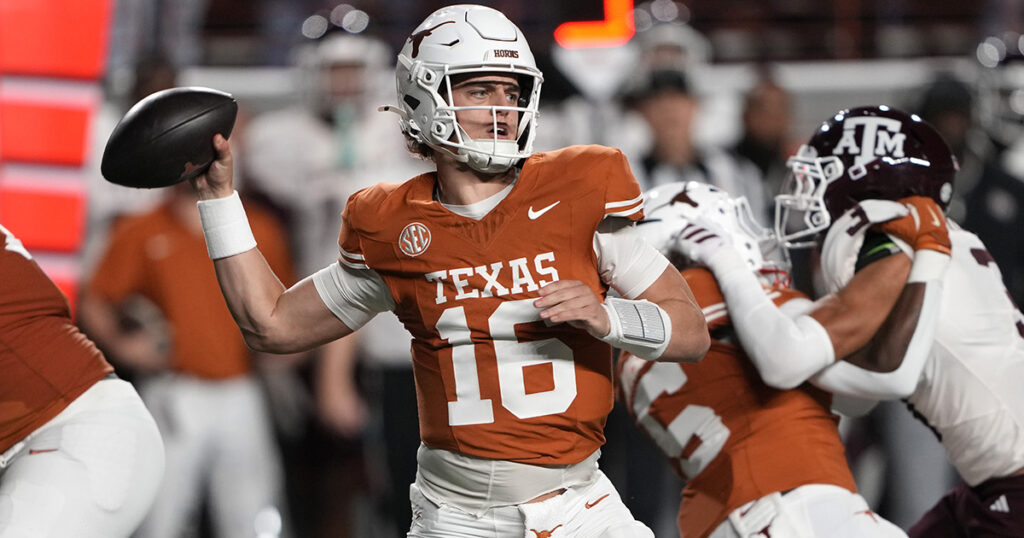
Date/Time: Nov. 28, 7:30 p.m. ET
Channel: ABC
Viewers: 13.0 million
The Lone Star Showdown had plenty at stake as Texas A&M headed to Texas. The Longhorns came away victorious, though, pulling off the upset in primetime on Black Friday in front of 13 million viewers on ABC.
Alabama vs. Auburn
Date/Time: Nov. 29, 7:30 p.m. ET
Channel: ABC
Viewers: 11.3 million
One of college football’s most storied rivalries returned to Jordan-Hare Stadium and it lived up to the billing. Alabama nearly saw a commanding lead disappear before eventually fighting off Auburn in the Iron Bowl, which drew 11.3 million viewers for ABC’s Saturday night game.
Georgia vs. Georgia Tech
Date/Time: Nov. 28, 3:30 p.m. ET
Channel: ABC
Viewers: 8.7 million
The Clean, Old Fashioned Hate game saw two top teams in their respective conferences square off. Ultimately, Georgia rose to the occasion in a big way, handling Georgia Tech with ease at Mercedes-Benz Stadium in the rivalry affair.
LSU vs. Oklahoma
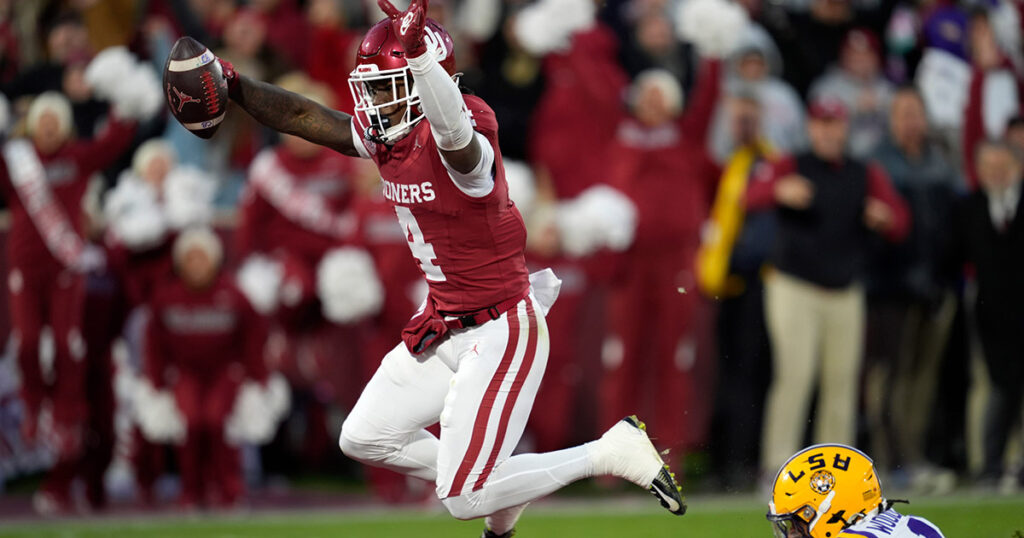
Date/Time: Nov. 29, 3:30 p.m. ET
Channel: ABC
Viewers: 6.4 million
Needing a win to continue its quest for a College Football Playoff berth, Oklahoma did just that in the late-afternoon window in Week 14. The Sooners took down LSU in Norman to put themselves in strong position in the 12-team bracket.
Ole Miss vs. Mississippi State
Date/Time: Nov. 28, Noon ET
Channel: ABC
Viewers: 5.2 million
All eyes were on the Egg Bowl as the Black Friday slate began as Ole Miss took down Mississippi State. It turned out to be the last game for Lane Kiffin as the Rebels’ head coach, and 5.2 million viewers were dialed in to watch.
Oregon vs. Washington
Date/Time: Nov. 29, 3:30 p.m. ET
Channel: CBS
Viewers: 4.3 million
In an old Pac-12 showdown, Oregon headed to Seattle for a late-afternoon matchup against Washington. The Ducks continued their strong season, taking down the Huskies in CBS’ Big Ten game – and the regular-season finale for analyst Gary Danielson.
Vanderbilt vs. Tennessee

Date/Time: Nov. 29, 3:30 p.m. ET
Channel: ESPN
Viewers: 4.0 million
The Diego Pavia Show arrived on Rocky Top as Vanderbilt took down Tennessee. The electrifying Commodores quarterback continued to make his case for the Heisman Trophy and did so on the big stage with 4.0 million people tuned to ESPN.
Iowa vs. Nebraska
Date/Time: Nov. 28, 3:30 p.m. ET
Channel: CBS
Viewers: 3.8 million
A top Big Ten rivalry looked a bit different this year as both Iowa and Nebraska’s offenses showed out early. But the Hawkeyes kept their foot to the floor, taking down the Huskers 40-16 in one of the Top 10 most-watched games of Week 14.
Cincinnati vs. TCU
Date/Time: Nov. 29, 3:30 p.m. ET
Channel: FOX
Viewers: 2.74 million
Immediately following Michigan-Ohio State, TCU vs. Cincinnati also drew strong numbers for FOX. The Horned Frogs handed the Bearcats a fourth straight loss to end the season and get to the 8-win mark for the 2025 season.
- Indiana vs. Purdue (Nov. 28, 7:30 p.m. ET, NBC) – 2.69 million
- USC vs. UCLA (Nov. 29, 7:30 p.m. ET, NBC) – 2.2 million
With 11 games topping 10 million viewers this year, college football put together a huge year for TV ratings. Three of the Top 10 most-watched games of the regular season came in Week 14, and it’s now on to conference championships.
NIL
SEC Commissioner Greg Sankey calls for changes to college football calendar after Lane Kiffin split with Ole Miss for LSU

If the Lane Kiffin to LSU saga exposed one thing, it was that the current college football calendar is really not conducive to major coaching changes. There are simply too many variables involved.
SEC commissioner Greg Sankey was asked if the league could put into place some kind of rule that would prevent one program from pulling another program’s coach before the end of a season. Realistically, it cannot.
“You have to go back a number of years, we had a rule about responsibility for outreach if you were going to contact another coach,” Sankey explained. “Our outside legal counsel suggested for anti-trust reasons that it be eliminated, which it was years and years ago. I think that’s an example of the difficulty just legislating at a conference level.”
In fact, Sankey essentially predicted some of the chaos that unfolded with the Lane Kiffin saga. He knew having so many things packed into one area of the calendar was going to create some unintended consequences.
“You can go find my quotes where I warned that an early signing period added in December would change the calendar and the timing of coach changes,” Sankey said. “I think now there are more factors involved. But, in fact, going back to the moment where we added the December signing period, you saw earlier terminations of coaches during the season, and then the need to rapidly hire a coach in late November and early December.”
That’s exactly what happened this offseason. Both Florida and LSU fired their coaches to go with weeks remaining in the season, kicking off the Lane Kiffin sweepstakes.
LSU eventually got the upper hand, but even then, the hiring was messy. There were reportedly ultimatums given to staffers looking to join Kiffin, though those claims were later disputed. All of this in the middle of a playoff run for Ole Miss.
Regardless, the Lane Kiffin ordeal clarified for many people that change is needed. Sankey offered a few avenues.
“There are opportunities for adjustments to the calendar that, at least in my view, probably won’t solve everything but could provide a healthier environment,” he said. “And where there are solutions, so that you’re not disrupting a team’s season, I think those should be pursued.
“Unfortunately the environment we’re in doesn’t allow and hasn’t resulted in some of the changes that even the basic change like removing that early signing period from kind of compelling people to make change rapidly has taken place. Can changes be made? Absolutely. Is it just the recruiting calendar? Likely not.”
What other solutions could there be? How can a Lane Kiffin 2.0 be averted?
“Perhaps it’s the competitive calendar that can be explored,” Sankey said. “But those are multi-level issues where people have different opinions. We’ve added a transfer portal on top of that signing period that adds to the complexity.
“But I think everyone would agree, and forget particular circumstances, you take a step back and whether it’s a roster or a coaching staff, looking at something other than maybe a medical emergency, we should be able to have competition through the year with those rosters and coaching staffs intact. And we ought to figure out how we can adjust collectively on a national basis to make that happen.”
NIL
Some thoughts on the Cookie Man and college football’s funniest coaching search so far

In partnership with

Good morning, and thanks for spending part of your day with Extra Points.
Save up to $100 on Qi35 This Holiday Season

The holiday season is here and TaylorMade is making it ridiculously easy to score something everyone on your list will actually love.
The Qi35 lineup is built for players who want more speed, more forgiveness, and a whole lot more fun on the course. Right now you can save $100 on Qi35 drivers and $50 on Qi35 fairway woods and rescue clubs.
Whether you’re upgrading your own bag or surprising the golfer in your life, this is the kind of gift that pays off round after round.
The trouble with trying to plan an editorial calendar in advance is stuff just keeps happening. I had a different story planned for today, but recent events have caused me to want to speak from the heart about something else.
Friends, I’d like to talk about the Cookie Man
As most of you know, BYU is owned and operated by the Church of Jesus Christ of Latter-day Saints, colloquially known as the Mormons. Devout Mormons do not drink alcohol, do not smoke, do not consume THC beverages or edibles, do not view pornography, do not gamble and generally do not participate in many of American society’s socially acceptable vices. Shoot, they don’t even drink coffee.
So what do you do when you need to temporarily dull the pain of being alive but are theologically prohibited from doing what everybody else does? You eat junk food. Utah County loves it some fancy soda pop and 1,500-calorie cookies.
Which is why it’s so funny that perhaps the most visible booster during the Kalani Sitake will-he-or-won’t-he-go-to-Penn-State storyline was Jason McGowan, the CEO of Crumbl Cookies. According to the Extra Points style guide, McGowan will henceforth be referred to as either “Big Cookie” or “the Cookie Man” in this publication.
It’s not every day that the public-facing booster of a fan base produces something so deeply aligned with that market. It’d be like if the biggest Wisconsin bag man were a cheese magnate, the biggest Idaho donor were the CEO of All the Potatoes, or the biggest Rutgers booster working in, uh, waste management.
As poet laureate and sports economist Lil Wayne once remarked, “real G’s move in silence like lasagna.” The boosters you hear about on Twitter — the people who are constantly talking to message-board owners — aren’t usually the ones throwing the biggest checks around. Those deep-pocketed boosters also typically don’t come from fun industries. There are exceptions, but across most schools, the biggest athletic boosters are folks involved in law, tech, high finance and, occasionally, agriculture.
I’ve talked to a few folks connected to BYU over the past few days, and I’m quite confident that was also the case here. It’s very funny to write “BIG COOKIE DEFEATS PENN STATE” or “COOKIE MAN OUTBIDS BIG TEN BLUEBLOOD” or something, but that isn’t actually what happened. The Cookie Man helped BYU keep Sitake, but if we’re interested in being Accurate Serious Professionals, it’s worth noting that Penn State’s contract offer was still more money than what BYU ultimately paid the coach, and that money didn’t all come from the Cookie Man.
It would be very funny if that money came from other LDS-adjacent industries (BIG MINIVAN! BIG UNFASHIONABLY MODEST FORMAL DRESSES! BIG FOLDING CHAIR!), but I imagine its sources were boring stuff like “executives at Goldman” or “various Silicon Slopes tech companies.” That’s more common, but it doesn’t make a good tweet.
Also, speaking of BYU and money …
Part of what makes this storyline so interesting to me, specifically, as a national college sports writer and also a guy who was a Mormon for a really long time, is how unlikely it would have seemed even just a few years ago.
BYU — and, for that matter, LDS institutions generally — has a reputation for not really paying top dollar anywhere. If you’re a professor, a baseball coach, a computer programmer or a construction manager, chances are, you can make more money doing what you do somewhere else. Part of that is a reflection of Utah’s labor market, but part of it is also ideological. BYU doesn’t want people attached to the institution by golden handcuffs. They want folks who want to be there. Do I always agree with that thinking? No, but I understand it.
By paying a football coach in the neighborhood of $9 million (as reported here and here), coupled with the investment in the men’s basketball program, it’s clear that BYU is prepared to spend competitively in the market. Whether that attitude changes elsewhere within church employment is interesting to me, but likely outside the scope of this newsletter.
I do think it’s worth noting where that money is coming from. BYU is a private school, and as such isn’t obligated to share contracts, MFRS reports or financial info at all, no matter how many times I ask very nicely. So I don’t have specific receipts.
But I do know that LDS church officials are very sensitive to the idea that specific church funds would be used for athletic payrolls, coach or athlete. Devout Latter-day Saints also pay a 10 percent tithe on their income to the church, money that is used to pay for educational, charitable and ecclesiastical operations around the globe. The idea that some widow’s mite in northern Brazil was used to pay LJ Martin would be a scandal … if not to the world, then certainly to most of the church community.
I’ve been told increased athletic investments are driven primarily by donors, rather than existing operational funds. And while I’d love to actually look at the books myself, I legitimately do believe that.
I’ll be curious, as senior church leadership becomes more global, or as public frustration with the status quo of college sports grows, whether there will be internal pushback on the optics of paying this kind of money. But maybe not! As the last 100-plus years have shown us, fans and the academy might get upset about rising expenses or ideological shifts … but they hate losing even more.
FWIW, I think Sitake is a very good football coach and worth locking up for BYU, especially given the paucity of other experienced LDS football coaching candidates. Will Penn State’s hire work out? Or any of these other hires? I have no idea. Can’t-miss hires fail all the time, and fourth choice candidates sometimes turn out to be the right ones.
A few quick back-of-the-notebook thoughts:
-
It looks like the SCORE Act, the Republican-driven college sports legislation that would have codified much of the House settlement terms, is dead … for now. Democratic leadership whipped against the vote, and just enough Republicans defected to keep the thing from passing. My read on the situation is that the defeat of SCORE shouldn’t be read as a bipartisan rejection of the idea that Congress shouldn’t get involved in these issues. In fact, at least one GOP rep, Chip Roy (TX), is saying that Congress should be more involved. I look at this more as a reminder that issues that have nothing to do with college sports can impact the legislative calendar, and the path to getting anything passed right now is razor-thin.
-
Anyway, I think this about sums it up:
Here’s what else we’ve been working on:
-
On Monday, I laid out the good, bad and ugly of the Extra Points business. We’re growing, our future is bright, but we need to be built less around ME. All of the details, and a 15 percent off discount code (sale ends this evening!) are here.
We want to finish the year strong, and we have some original reporting, special projects and plenty of FOIAing in the hopper the rest of the month. You can read everything we write by making sure you’ve upgraded to a premium subscription. These subscriptions pay our bills, from FOIA fees to bowl game sponsorships to travel and more.
And hey, as a parting gift, we finished a big update to Who’s That Football Team. We now have a daily Puzzle challenge. The game is totally free! Today’s clue comes from the FCS ranks, but who knows who will by our mystery program tomorrow….
NIL
Rep Jeffries blasts SCORE Act, labeling it the ‘Lane Kiffin Protection Act’
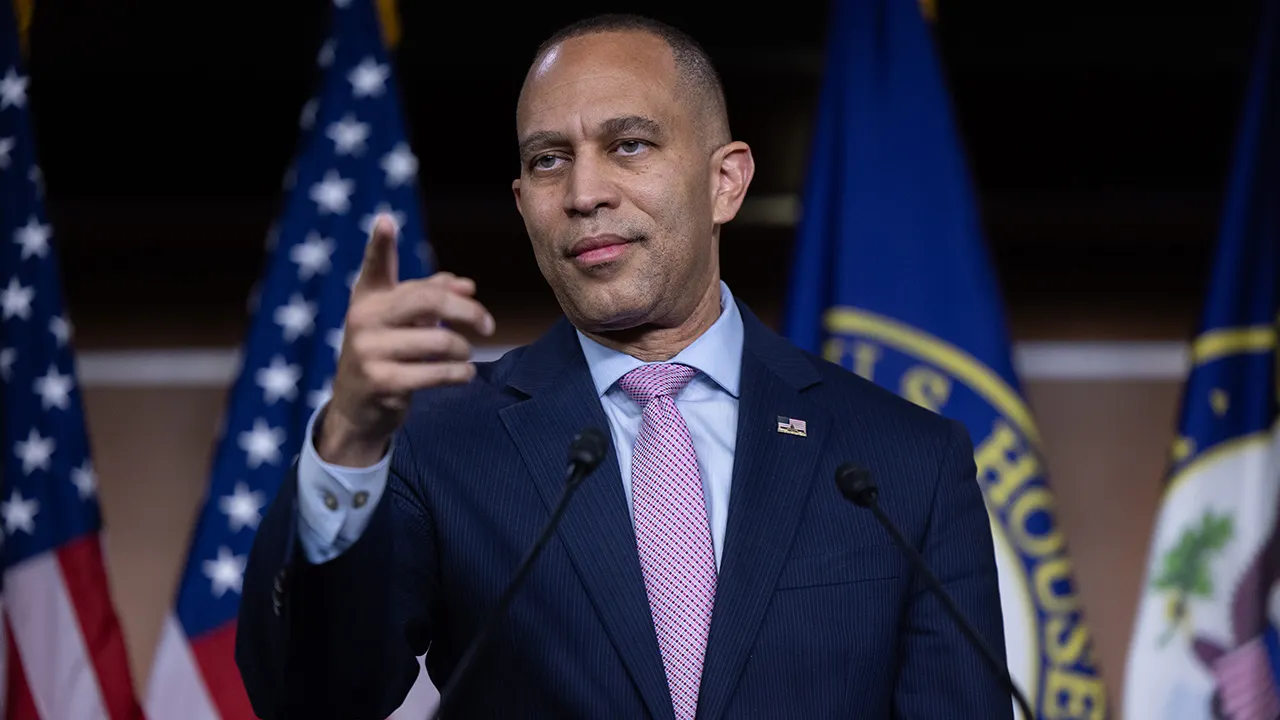
NEWYou can now listen to Fox News articles!
The proposed SCORE Act promises to provide the NCAA with a limited antitrust exemption in hopes of protecting the organization that regulates student athletics from potential lawsuits over eligibility rules, and it would prohibit athletes from becoming employees of their schools.
Shortly before it was set to be brought to the floor on Wednesday, House leadership canceled a vote on the SCORE Act. The decision came amid concerns about whether Speaker of the House Mike Johnson, R-La., had secured the required votes for passage.
Following the delay, House Minority Leader Hakeem Jeffries, D-N.Y., voiced his concerns about the chaotic events leading up to what ultimately became a failed effort to move the bill forward.
CLICK HERE FOR MORE SPORTS COVERAGE ON FOXNEWS.COM

U.S. House Minority Leader Hakeem Jeffries (D-NY) during a news conference at the US Capitol in Washington, D.C., on Monday, Nov. 10, 2025. (Aaron Schwartz/Bloomberg via Getty Images)
“The question that a lot of people are asking this week related to the SCORE Act legislation is who exactly directed Mike Johnson and Steve Scalise to bring this bill to the floor this week? Was it the big donors connected to LSU? That legislation would not have benefited college athletes. It would hurt college athletes, take away the antitrust exemption. It would preempt the ability of states to actually pass legislation that promotes the health, the safety and the well-being of their own college students.”
GOP REP RIPS BIG TEN COMMISH AFTER SCORE ACT VOTE GETS DELAYED
Jeffries continued: “It would take away legal rights to seek redress the organized labor unions across the country were strongly opposed because it undermined the ability of college athletes and undermined their freedom to negotiate, took away collective bargaining rights. And of course, the players’ associations across every sports league led by the NFL Players Association were opposed to it because they concluded, when evaluating the bill on the merits, that it would actually hurt college athletes, not help them.”
Jeffries then facetiously renamed the SCORE Act to the “Lane Kiffin Protection Act.”
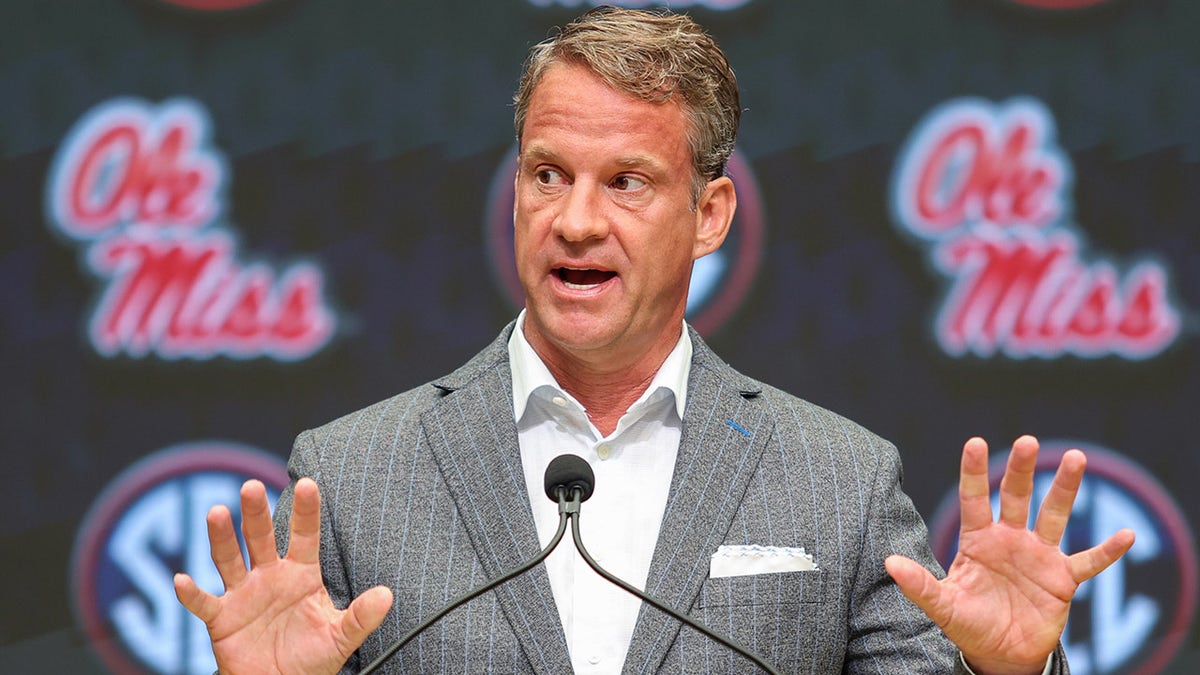
Ole Miss Rebels head coach Lane Kiffin speaks to the media during SEC Media Day at Omni Atlanta Hotel on July 14, 2025. (Jordan Godfree/Imagn Images)
“Why would Mike Johnson and Steve Scalise think it was a good idea to bring the Lane Kiffin Protection Act to the floor of the House of Representatives? Legislation that would do nothing to benefit college athletes and everything to benefit coaches like Lane Kiffin, who got out of town, abandoned his players in the middle of a playoff run to go get a $100 million contract from LSU, the home state of Mike Johnson and Steve Scalise.”

(L-R) Speaker of the House Mike Johnson (R-LA), House Majority Leader Rep. Steve Scalise (R-LA), and House Minority Leader Hakeem Jeffries (D-NY), participate in the first nail ceremony for the construction of the 2025 presidential inauguration platform on the West Front of the U.S. Capitol Building on Sept. 18, 2024 in Washington, D.C. (Andrew Harnik/Getty Images)
“People are asking the question, why did you decide to bring this bill this week with all the other issues that the country is demanding that we focus on, led by the affordability crisis that they claim is a scam and a hoax, but that the American people know is very real.”
A narrow 210-209 procedural vote was enough to get the bill to the House.
CLICK HERE TO GET THE FOX NEWS APP
The SCORE Act calls on schools to share revenue, per terms of the House settlement, per terms of the House settlement to the tune of 22% “if such rules provide that such pool limit is AT LEAST 22 percent of the average annual college sports revenue of the 70 highest-earning schools.”
The bill would also prohibit schools from using student fees to fund NIL payments.
Proponents of the proposed legislation have argued the SCORE Act would introduce some stability to college sports amid a landscape that increasingly lacks adequate regulation. However, critics have pointed to the possibility of returning arguably too much power back to schools and the NCAA.
Fox News’ Ryan Gaydos contributed to this report.
Follow Fox News Digital’s sports coverage on X, and subscribe to the Fox News Sports Huddle newsletter.
-

 Rec Sports2 weeks ago
Rec Sports2 weeks agoFirst Tee Winter Registration is open
-

 Rec Sports1 week ago
Rec Sports1 week agoFargo girl, 13, dies after collapsing during school basketball game – Grand Forks Herald
-

 Motorsports1 week ago
Motorsports1 week agoCPG Brands Like Allegra Are Betting on F1 for the First Time
-
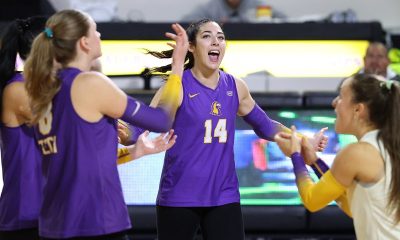
 Sports2 weeks ago
Sports2 weeks agoVolleyball Recaps – November 18
-

 Motorsports2 weeks ago
Motorsports2 weeks agoF1 Las Vegas: Verstappen win, Norris and Piastri DQ tighten 2025 title fight
-

 Sports1 week ago
Sports1 week agoTwo Pro Volleyball Leagues Serve Up Plans for Minnesota Teams
-

 Sports1 week ago
Sports1 week agoSycamores unveil 2026 track and field schedule
-

 Sports1 week ago
Sports1 week agoUtah State Announces 2025-26 Indoor Track & Field Schedule
-

 Sports1 week ago
Sports1 week agoTexas volleyball vs Kentucky game score: Live SEC tournament updates
-

 NIL5 days ago
NIL5 days agoBowl Projections: ESPN predicts 12-team College Football Playoff bracket, full bowl slate after Week 14























































